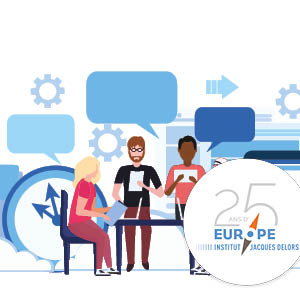Vers un compte de formation individuel européen

La pandémie de COVID-19 a déclenché la plus grave crise économique depuis la Grande Dépression des années 1930. Si les systèmes de chômage partiel mis en place dans les pays européens ont permis de limiter les pertes d’emplois, certains secteurs ont été particulièrement touchés ; le taux de chômage et les besoins en matière de transition professionnelle risquent ainsi d’augmenter fortement au cours des prochains mois, une fois que ces dispositifs prendront fin. La crise et la stratégie de relance adoptée par les décideurs européens devraient par ailleurs accélérer les transitions numérique et écologique et, par conséquent, intensifier les évolutions rapides et profondes déjà à l’œuvre sur le marché du travail. En effet, les grandes tendances actuelles – numérisation, mondialisation, vieillissement de la population et transition écologique – modifient la quantité et la qualité des emplois disponibles. Certains seront détruits et d’autres considérablement transformés, notamment du fait de l’automatisation. Mais de nouveaux emplois seront également créés, par exemple dans l’intelligence artificielle, l’économie des soins ou encore dans les domaines liés à la transition écologique comme les énergies renouvelables, l’efficacité énergétique, l’économie circulaire et la gestion des déchets.
Le développement des compétences est un catalyseur important de ces transformations. Ce n’est qu’avec une main d’œuvre qualifiée et résiliente qu’il sera possible de maximiser les opportunités offertes par les transitions en cours. Comme le disait déjà Jacques Delors en 1989, la formation permanente ne permet pas seulement aux individus de s’adapter au changement, mais de le maîtriser. Parallèlement, le besoin de mise à niveau des compétences et de reconversion professionnelle continue à augmenter dans l’UE. Pour y répondre et atteindre le nouvel objectif de l’UE visant à ce qu’au moins 60 % des adultes européens se forment chaque année d’ici 2030, les systèmes de formation des adultes ont un rôle clé à jouer afin d’aider les individus à conserver leurs compétences et à en acquérir de nouvelles tout au long de leur vie professionnelle.
Dans l’UE, les systèmes de formation des adultes sont tous confrontés à des défis communs. Alors que, dans le domaine de la formation des adultes, la responsabilité relève principalement des niveaux national et régional, l’UE a un rôle important à jouer pour s’assurer que le droit à l’éducation et à la formation tout au long de la vie, inscrit dans le Socle européen des droits sociaux, devienne une réalité pour tous les Européens. Pour cela, la Commission européenne s’est engagée à étudier l’idée de comptes de formation individuels afin de combler les lacunes constatées dans l’accès à la formation des adultes et de donner à ces derniers les moyens de réussir leurs transitions sur le marché du travail.
Élaboré sur la base d’un récent Rapport sur ce sujet, ce décryptage identifie les lacunes actuelles des systèmes de formation des adultes dans l’UE et présente des propositions pour y répondre, en recommandant une initiative de l’UE sur les comptes de formation individuels. Nous suggérons pour cela une action européenne en deux temps : tout d’abord, en adoptant une recommandation européenne visant à promouvoir la mise en place de comptes de formation individuels nationaux conformes à des lignes directrices européennes, puis en créant un compte de formation individuel européen qui assurerait la portabilité des droits non seulement d’un emploi ou d’un statut à un autre, mais aussi d’un pays à un autre.





